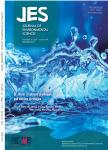A meteorologically adjusted ensemble Kalman filter approach for inversing daily emissions:A case study in the Pearl River Delta,China
A meteorologically adjusted ensemble Kalman filter approach for inversing daily emissions: A case study in the Pearl River Delta, China作者机构:School of Environment and EnergySouth China University of TechnologyUniversity Town CampusGuangzhou 510006China Institute for Environmental and Climate ResearchJinan UniversityGuangzhou 511486China Institute of Atmospheric PhysicsChinese Academy of SciencesBeijing 100029China Faculty of Social and Behavioural SciencesUtrecht UniversityUtrechtCH 3584the Netherlands Guangzhou Institute of Tropical and Marine MeteorologyChina Meteorological AdministrationGuangzhou 510640China State Environmental Protection Key Laboratory of Regional Air Quality MonitoringGuangdong Environmental Monitoring CenterGuangzhou 510308China Department of Environmental Science and EngineeringCollege of Architecture and EnvironmentSichuan UniversityChengdu 610065China
出 版 物:《Journal of Environmental Sciences》 (环境科学学报(英文版))
年 卷 期:2022年第34卷第4期
页 面:233-248页
核心收录:
学科分类:07[理学] 070602[理学-大气物理学与大气环境] 0706[理学-大气科学]
基 金:supported by the National Key Research and Development Program of China(No.2018YFC0213905) National Natural Science Foundation of China(Nos.91744310and 41805068) Natural Science Foundation of Guangdong Province(No.2018A030310654)
主 题:Emission inversion Daily emissions Meteorological adjustment Ensemble Kalman filter
摘 要:The conventional Ensemble Kalman filter(EnKF),which is now widely used to calibrate emission inventories and to improve air quality simulations,is susceptible to simulation errors of meteorological inputs,making accurate updates of high temporal-resolution emission inventories *** this study,we developed a novel meteorologically adjusted inversion method(MAEInv)based on the EnKF to improve daily emission *** new method combines sensitivity analysis and bias correction to alleviate the inversion biases caused by errors of meteorological *** demonstration,we used the MAEInv to inverse daily carbon monoxide(CO)emissions in the Pearl River Delta(PRD)region,*** the case study,60%of the total CO simulation biases were associated with sensitive meteorological inputs,which would lead to the overestimation of daily variations of posterior *** the new inversion method,daily variations of emissions shrank dramatically,with the percentage change decreased by 30%.Also,the total amount of posterior CO emissions estimated by the MAEInv decreased by 14%,indicating that posterior CO emissions might be overestimated using the conventional *** evaluations using independent observations revealed that daily CO emissions estimated by MAEInv better reproduce the magnitude and temporal patterns of ambient CO concentration,with a higher correlation coefficient(R,+37.0%)and lower normalized mean bias(NMB,-17.9%).Since errors of meteorological inputs are major sources of simulation biases for both low-reactive and reactive pollutants,the MAEInv is also applicable to improve the daily emission inversions of reactive pollutants.



